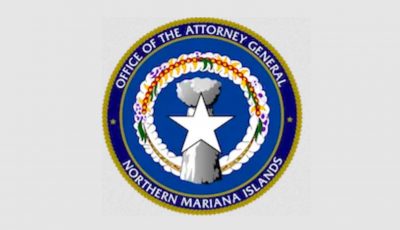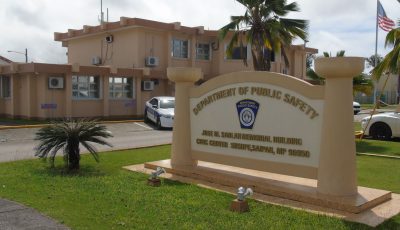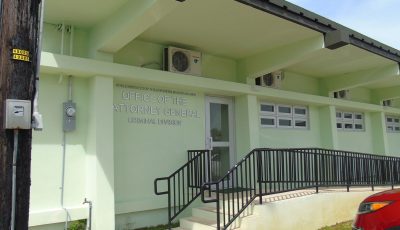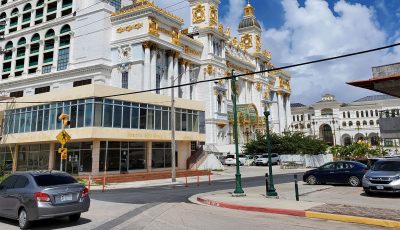Senate recalls, passes casino law changes
The Senate recalled yesterday a bill to amend the casino law that they had passed last Thursday, passing instead yesterday afternoon a bill that addressed concerns raised by the CNMI attorney general over provisions that would exempt casino regulators from the Open Government Act, among others, as well as concerns of regulators to have their own legal counsel in light of what they described as the attorney general’s attack on the commission’s integrity.
As this developed, the Commonwealth Casino Commission sent a letter to CNMI Attorney General Edward Manibusan yesterday, responding to claims on Friday that the proposed changes to the casino law would make the commission a “prime candidate for corruption.”
The commission’s letter alleged that Manibusan misperceived or misinterpreted facts. The commission said the AG letter revealed Manibusan’s “grave misunderstanding of the gaming industry” and his failure to recognize that the OAG itself helped draft House Bill 19-95, the casino bill amendments. Regulators called the discrepancy an apparent “internal breakdown in communications within the AG office.”
All nine members of the Senate voted to recall and then pass the updated House Bill 19-95, HD1, HS1.
Facilities
The Senate put back the words “casino” before a provision on “exclusion from gambling.” It now reads: “Casino gaming and wagering is authorized in the Commonwealth provide that such gaming and wagering occurs in the casino facilities of the casino operate…or in casino facility licensed…”
The Senate inserted “casino” before the “facilities of the casino operator” and before “in a facility licensee.”
This was apparently in response to Manibusan’s concern who had argued that the previous language would have allowed gambling to take place in any facilities like restaurants, Laundromats, and concession stands.
The casino commission, though, said the proposed amendment was meant to clarify sites that were already approved by the casino agreement between Best Sunshine International Ltd. and the Commonwealth Lottery Commission, which regulators said they were not a party to.
“To suggest that the casino licensee could conduct gambling activities in restaurants, Laundromats…exaggerates the truth and demonstrates a lack of understanding and awareness of existing provisions” in previous casino law and casino agreements, the commission said.
Funding, personnel, salaries
A Senate provision yesterday subjects a “Commonwealth Casino Regulatory Fee Fund” to annual appropriation beginning fiscal year 2017.”
Additionally, the bill also provides that “the casino regulatory fee of $3,000,000 for fiscal year 2015” will be appropriated to the casino commission for its personnel and operations expenditures. The Senate also authorizes the commission to “hire or fill 35 full-time employee positions for FY 2016.”
Casino commission personnel are currently on contracts, renewed every several months. With the exception of the $1,000 allocated to them in next year’s fiscal budget, all of the commission’s costs are paid by Best Sunshine through a “casino regulatory fee.”
Under the amended bill, casino commissioners will be compensated after the first year of the commission’s existence at a rate of $65,000 per year, provided that, the Senate adds, each commissioner attend “all scheduled meetings unless excused by the chairperson of the commission.”
Open government
Manibusan said Friday that amendments that would exempt the casino commission from the OGA were “extraordinarily broad,” freeing them from government oversight and making them a prime candidate for corruption.
The casino commission believes, however, that they need some leeway to properly investigate and regulate the casino industry as well as protect documents they believe would be sensitive and private but not covered by the OGA.
“Casino security, surveillance, cage, cashier, and other related sensitive information are confidential and should not be subject to public disclosure,” the commission writes.
Manibusan had also called out a provision that he suggested would allow the commission to meet in secret and authorize its personnel to gamble at the casino, “either as part of a phony investigation, or simply because the personnel wanted to gamble.”
The commission yesterday called this “insulting” to the commission’s enforcement officers and “quite shocking to hear” from the CNMI’s highest law enforcement officer. The regulators explained that the provision would allow undercover agents to take part in gaming when necessary. “The major focus of this activity is to track the movements of funds and to audit and certify the accuracy of the casino revenue collection and accounting process,” the commission writes.
In their new version, the Senate adds a provision that would compel the commission to follow the Open Government Act.
The Senate further clarifies what may be deemed “confidential” in their substitute bill. Here, the Senate follows the AG recommendation to define confidentiality akin to the New Jersey Casino Control Act.
The following information will not be considered confidential and will be made available for public inspection:
– A licensee’s gross revenue from gaming activities and simulcast wagering;
– The dollar amount of patron checks initially accepted by a licensee, the dollar amount of patron checks deposited to the licensee’s bank account, the dollar mount of checks initially dishonored by the bank and returned to the licensee as uncollected, and the dollar amount ultimately uncollected after all reasonable efforts;
– The amount of gross revenue tax or investment alternative tax actually paid and the amount of investment required;
– A list of premises and the nature of improvements, its costs and the payees for all improvements;
– A list of premises, nature of improvements and costs which constitute the cumulative investments by which the licensee recaptured profits pursuant to Commonwealth law;
– All quarterly annual and financial statements presenting historical data that are submitted to the commission, including all annual financial statements that have been audited by an independent certified public accountant licensed to practice in the CNMI;
– The identity and nature of services provided by any person or firm receiving payment in any form whatsoever for professional services in connection with the authorization or conduct of games conducted at a casino establishment
Legal counsel
The Senate also allowed the commission to hire staff inclusive of “a legal counsel and other professionals.”
In their letter to the AG yesterday, the commission called for an ability to secure its independent legal counsel in light of the controversial letter from the AG, and the apparent miscommunication between assistant attorneys general under Manibusan who were separately assigned to the commission and to review the bill the AG’s office itself had drafted.



























